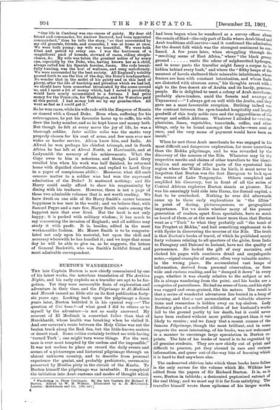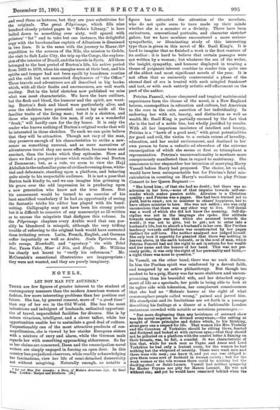BURTON'S WANDERINGS.* THE late Captain Burton is now chiefly remembered
by one of his latest works, the notorious translation of The Arabian Nights, and his early exploits as a traveller are apt to be for- gotten. Yet they were memorable feats of exploration and adventure in their time and the Pilgrimage to Al-Madinah and Meecah caused no little stir on its first publication forty- six years ago. Looking back upon the pilgrimage a dozen years later, Burton belittled it in his cynical way :—" The question of Cui bono?—of what good I did to others or to myself by the adventure—is not so easily answered. My account of El Medinah is somewhat fuller than that of Burckhardt, whose health was breaking when he visited it. And our caravan's route between the Holy Cities was not the beaten track along the Red Sea, but the little-known eastern or desert road. Some critics certainly twitted me with having 'turned Turk '; one might turn worse things. For the rest,' Man is ever most tempted by the useless and the impossible." It was not useless to place on record the daily events and scenes of a picturesque and historical pilgrimage through an almost unknown country, and to describe from personal experience the quaint, and probably prehistoric, ceremonies preserved by Muslim piety in the circuit of the Kaaba. To Burton himself the pilgrimage was invaluable. It completed the initiation into Arab customs and modes of thought which
• Wallafrillpll In Threw Contimats. By the late Captain Sir Richard V. Burton. Edited by W. H. Wilkina illustrated by A. D. McCormick.
London; Hutchinson and Co. lies. net.] •
had been begun when he wandered as a survey officer about the canals of Sind—the only part of India where Arab blood and Arab traditions still survive—and it confirmed the admiration for the desert folk which was the strongest sentiment he em. fessed. A few years later, when struggling through the "revolting scene of East Africa," where "the black greasy ground emits the odour of sulphuretted hydrogen, and in some parts the traveller might fancy a corpse to be hidden behind every bush," and where the "filthy heaps of the meanest of hovels sheltered their miserable inhabitants, whose frames are lean with constant intoxication, and whose limbs are distorted with ulcerous sores," his thoughts revert with a sigh to ,the free desert air of Arabia and its hardy, generous people. He is delighted to meet a colony of Arab merchants, probably slave-traders, amid the forests and swamps cf Unyamwezi :—" I always got on well with the Arabs, and they gave me a most favourable reception. Striking indeed was the contrast between the open-handed hospitality and hearty goodwill of this truly noble race and the niggardliness of the savage and selfish Africans. Whatever I alluded to—on:ons, plantains, limes, vegetables, tamarinds, coffee, and other things, only to be found amongst the Arabs—were sent at once, and the very name of payment would have been an insult."
When he met these Arab merchants he was engaged in his most difficult and dangerous exploration, far more hazardous than the Mekka pilgrimage, and he was rewarded by the discovery of the sources of the Nile. Whatever may be the respective merits and claims of other travellers to the identi- fication and survey of other parts of the equatorial lake region where the White Nile has its birth, it must never be forgotten that Burton was the first European to look upon the waters of Lake Tanganyika. Others completed and amplified his discovery, but in front of all the series of Central African explorers Burton stands as pioneer. Nor was his amazingly bold ride into Harar, the Somali capital, a feat to be overlooked. Nothing he ever did afterwards came up to these early explorations in "the fifties" in point of daring, picturesqueness, or geographical importance. Yet we doubt whether many of the present generation of readers, apart from specialists, have so much as heard of them, or at the most know more than that Barton went as a " Turk " to what they probably call "the tomb of the Prophet at Mekka," and had something unpleasant to do with Speke in discovering the sources of the Nile. The truth is that Barton's books of travel, of which he published nearly forty volumes relating to all quarters of the globe, from India to Paraguay and Dahome to Iceland, have not the quality of permanence. He lacked the gift of easy narrative, and choked his pages with cumbrous detail and encyelopmdic notes,—signal examples of matter, often very valuable matter, in the wrong place. He accumulated vast heaps of information, derived from personal observation, or from wide and curious reading, and he "dumped it down" in every page, whether it was closely relative to the subject or not. He is always wandering from the point, and his books are a congeries of parentheses. He had no sense of form, and his style was rugged and cross-grained, like his nature. The result is that a series of wonderful adventures lies buried in a heap of learning, and that a vast accumulation of valuable observa- tions and researches is hidden away on top shelves. Lady Burton's plan of a collected edition of her husband's works fell to the ground partly by her death, but it could never have been realised without more public support than it was likely to receive ; and we fancy that a recent reissue of the famous Pilgrimage, though the most brilliant., and in some respects the most interesting, of his books, was not welcomed in a manner to encourage large speculation in Burton re- prints. The fate of his books of travel is to be regretted by all genuine students. They are now chiefly out of print and difficult to procure, yet they abound in rare and curious 'information, and queer out-Of-the-way bits of learning which it is hard to find anywhere else.
The undeserved oblivion into which these books have fallen is the only excuse for the volume which Mr. Wilkins has edited from the papers of Sir Richard Burton. It is, as it were, Burton in tabloids; a desiccated peptonised extract of the real thing; and we must say it is far from satisfying. The traveller himself -wrote these epitomes of his larger works, and read them as lectures, but they are poor substitutes for the originals. The great Pilgrimage, which fills nine hundred closely printed pages in " Bohn's Library," is here boiled down to something over sixty, well spaced with printers' " fat " and to take but one instance, the delightful orgy with the bacchanalian captain of Albanians is dismissed in two lines. It is the same with the journey to Harar, the expedition to the sources of the Nile, the mission to Gelele, the visit to Salt Lake City, the trip up the Congo, the explora- tion of the interior of Brazil, and the travels in Syria. All these belonged to the best period of Burton's life, his active period from 1853 to 1870, when his energies were at their best, and his spirits and temper had not been spoilt by humdrum routine and the cold but not unmerited displeasure of "the Office." These travels and adventures are all described in big books, which, with all their faults and excrescences, are well worth reading. But in the brief sketches now published we miss what was most characteristic. We have the bare outlines, but the flesh and blood, the humour and the spirit, are want- ing. Burton's flesh and blood were particularly alive, and even the skeleton here presented cannot lay aside all the familiar traits of the living man ; but it is a skeleton, and those who appreciate the live man, if only as a wonderful "freak," will hardly care for the dry bones. It is only the reader who knows nothing of Burton's original works that will be interested in these sketches. To such we can quite believe that they will be attractive. Though not racy of the man, they preserve enough of his characteristics to strike a new- comer as something unusual, and as mere narratives of adventurous travel they are more effective, because terse and succinct, than the books which they epitomise. Here and there we find a pungent phrase which recalls the real Burton of Damascus ; but, as a rule, we seem to view the Hajj Abdullah in the unfamiliar guise of civilised evening dress, white. tied and debozmair, standing upon a platform, and behaving quite nicely to his respectable audience. It is not a pose that Burton took kindly to, and we can imagine him grinning in his grave over the odd impression he is producing upon a new generation who know not the true Moses. But his amusement would be turned to an exercise of his least sanctified vocabulary if he had an opportunity of seeing the fantastic tricks his editor has played with his hand- writing. Calligraphy may not have been his strong point, but it is difficult to conceive of any manuscript so ill-written as to excuse the misprints that disfigure this volume. In the Pilgrimage chapters every Arabic word that can pos- sibly be blundered is misspelt, although the very trifling trouble of referring to the original book would have corrected these irritating errors. Latin, French, English, and German suffer impartially as well as Arabic. Scala Tyrivrum, La belle savage, Humbodlt, and " apostacy " vie with Tebel Nur, Yawn Vahr, Maar el Din, and Hazfa. Mr. Wilkins has clearly not learnt to "verify his references." Mr. McCormick's sensational illustrations are inappropriate ; they were not wanted, and they are purely imaginary.











































 Previous page
Previous page